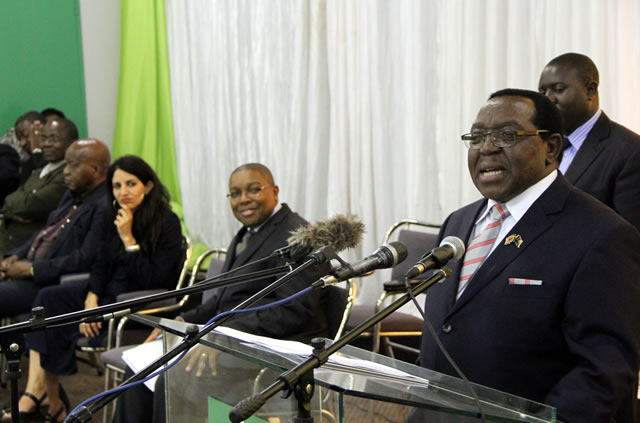Academics challenged on Zim-Asset

Prosper Ndlovu Senior Reporter
THE Senior Minister of State, Cde Simon Khaya Moyo, has challenged academics and civic society to steer debate around the ideals of the new economic blueprint, the Zimbabwe Agenda for Socio-Economic Transformation (Zim-Asset). Delivering his keynote address while officially opening the Government-Civic Society Special Conference on Zimbabwe’s future in Bulawayo yesterday evening, Cde Khaya Moyo said Zim-Asset, which draws inspiration from the winning Zanu-PF manifesto, provides a template for all developmental efforts in the country up to the next elections and beyond.
As such, he said, all deliberations on the future socio-economic prospects of the country must not deviate from the ideals of Zim-Asset.
“The Zanu-PF manifesto, President Mugabe’s inauguration speech and Zim-Asset, when read together, set a clear course for Zimbabwe’s socio-economic progress going forward and therefore, constitute a reality that any policy dialogue cannot ignore,” said Cde Khaya Moyo who is also Zanu-PF National Chairman.
He said Zim-Asset does not leave room for speculation about the development future of the country as the document captures in full the aspirations, dreams, expectations and hopes of all Zimbabweans.
Zim-Asset is anchored on developing four strategic clusters, food security and nutrition, social service and poverty, education, infrastructure and utilities and value addition and beneficiation.
Said Cde Khaya Moyo: “These, indeed, are the ideals that we stand for, which we have set out to deliver through Zim-Asset. We have noble and constructive intentions as a Government and in this regard . . . in the interest of inclusive national policy dialogue and consensus building, to advise this conference series, to focus its deliberations and findings on how to improve and or subtract, enhance and make Zim-Asset work and achieve its grand national objectives.”
He said the 31 July election outcome, in which Zanu-PF won resoundingly, was a reality that no one can dispute as the poll results were endorsed by the Sadc, African Union, Comesa, the United Nations and the Brics.
Cde Khaya Moyo said reference to this reality was crucial in making Zimbabweans understand the impact of the illegal sanctions imposed by the West and the United States on the socio-economic growth of the country.
“Sanctions are real and comprehensive. Thus, as we craft strategies for the future, we need to take into account that such strategies must circumvent and ultimately render the illegal western economic sanctions irrelevant to our national economic recovery and growth,” he said.
Cde Khaya Moyo urged civic society to develop a culture of constructive deliberations that promote trust, inclusivity and singleness of purpose between the Government and its people.
He said debates on issues should not be allowed to degenerate into an unproductive binge of anti-Zanu-PF accusations, blame and name calling.
“We want our civic society to be truly homegrown and not to pander to the whims, caprices and direction of their foreign sources of funding. Civic society must not be a vehicle for deepening and accentuating the political polarisation of our society,” said Cde Khaya Moyo.
He assured the country that meaningful success was guaranteed if all Zimbabweans rallied behind Zim-Asset and worked towards mobilising resources towards its fulfillment.
The inaugural conference, which runs under the theme “Zimbabwe: Present Realities, Future Prospects” began at a local hotel yesterday and ends tomorrow.
The National University of Science and Technology (Nust), the University of Zimbabwe and the Midlands State University (MSU) in collaboration with the civic society organisations are the organisers of the event.
Among the topics for discussion is the role of civic society in shaping the future of the country, resource mobilisation, corruption, education and health development, peace and justice, the land reform and climate and the impact of modern information and communication technologies.










Comments